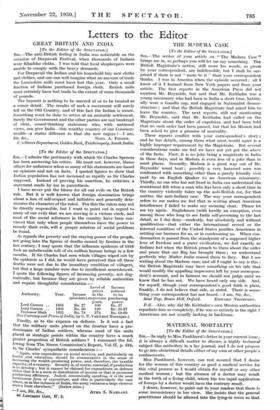[To the Editor of the SPECTATOR.]
Sra,—I admire the pertinacity with which Sir Charles Spencer has been answering his critics. He must not, however, blame others for unfairness when an many of his statements are based on opinions and not on facts. I quoted figures to show that Indian population has not increased as rapidly as Sir Charles supposed. Instead of proving his assertion, he criticizes a statement made by me in parenthesis.
I have never put the blame for all our evils on the British rule. But it is well known that foreign domination brings about a loss of self-respect and initiative and generally dete- riorates the character of the ruled. For this the rulers may not be directly responsible, but I want to point out in regard to many of our evils that we arc moving in a vicious circle, and most of the social reformers in the country have been con- vinced that only when people themselves have the power to remedy their evils, will a proper solution of social problems be found.
As regards the poverty and the staving power of the people, not going into the figures of deaths caused by famines in the last century, I may quote that the influenza epidemic of 1918 took an unbelievable toll of six million human beings in a few months. If Sir Charles had seen whole villages wiped out by the epidemic as I did, he.would have perceived that all these deaths were not due to the insanitary condition of villagers, but that a large number were due to insufficient nourishment. I quote the following figures of increasing poverty, not dog- matically, but because they are given by reliable authorities and require thoughtful consideration :— Level of Income prices reduced Authority. Year. Income in the to its
(absolute).respective purchasing years. power. Lord Cromer .. 1881 Rs. 27 100 Its. 27
Lord Curzon .. 1901 RS. 30 120 Rs. 20.37 Professor Shah 1921 Rs. 74 378 Rs. 19.80 (See Currency and Prices of India, by C. N. Veld' and Muranjan.) Finally, as to the expense on defence. Is it not a fact that the military, units placed on the frontier have a pre- dominance of Indian soldiers, whereas most of the units placed at strategic points within the country have a much greater proportion of British soldiers ? I commend the foL lowing from The Simon Commission's Report, Vol. II, p. 216, to Sir Charles' sympathetic consideration :— "Again, wise expenditure on social services, and particularly on health and education, should be remunerative in the sense of increasing the wealth-producing power, and, therefore, the taxable capacity, of a country. Security is, of course, essential, if production is to develop ; but it cannot be claimed for expenditure on defence either that it is a mere re-distribution of income or that it promotes Production' efficiency. Indeed, economically speaking, it ie the most burdensome form of expenditure, and this is particularly the case where, as in the instance of India, the army contains a large element drawn from elsewhere." (Italics mine.) 46 Lancaster Gate, W. 2.


















































































 Previous page
Previous page